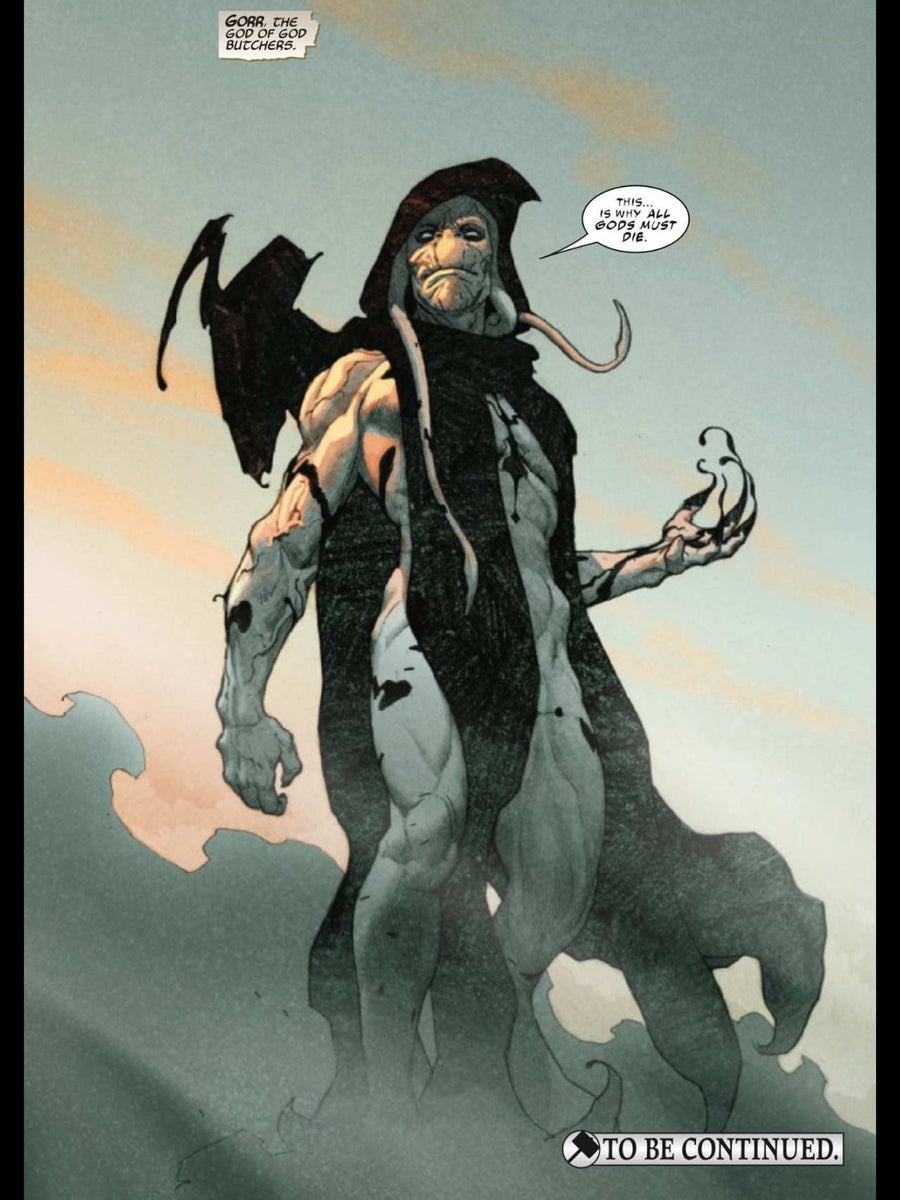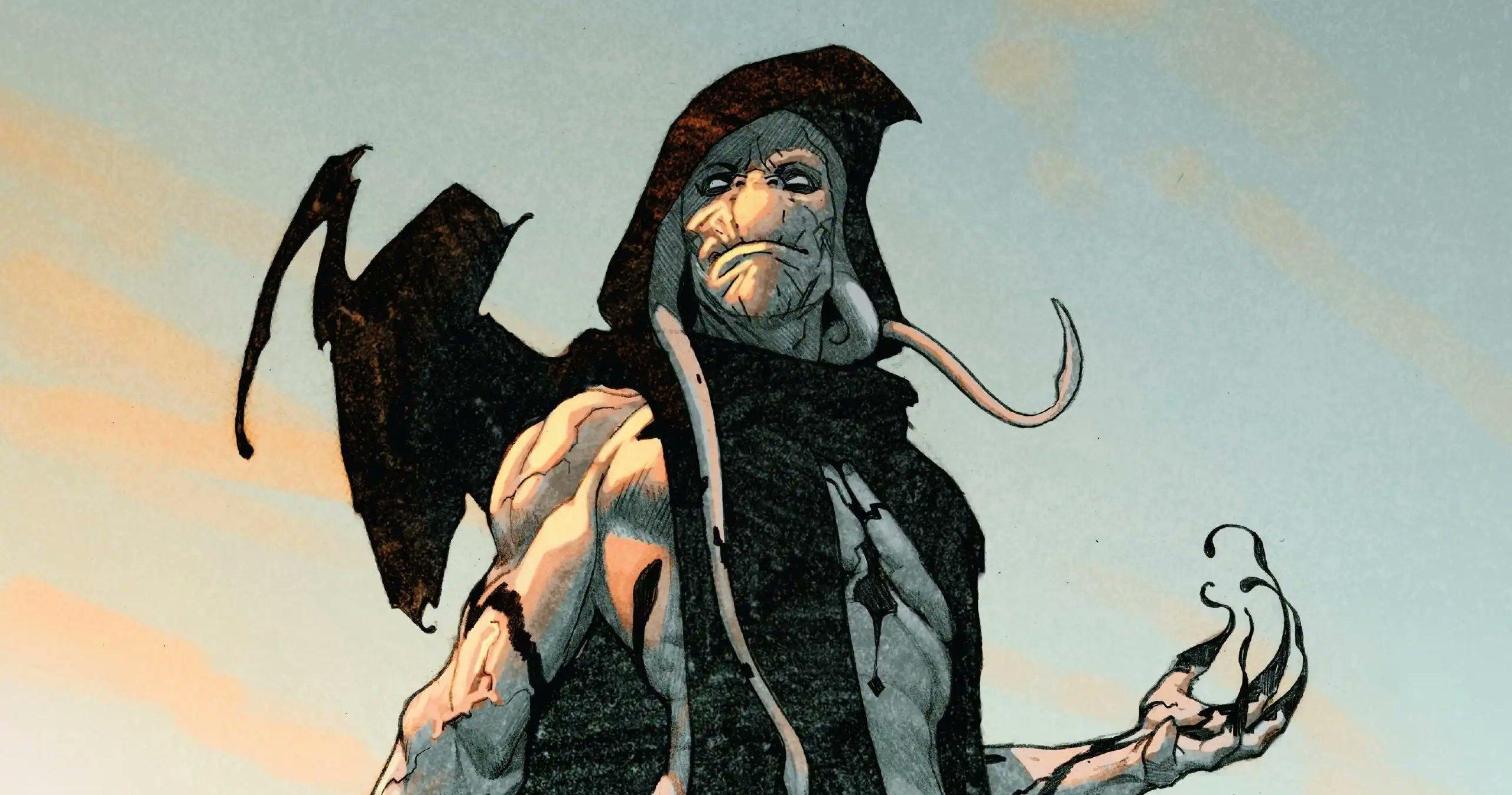Gorr The God Butcher: The Myth, The Legend, The Villain + More!
Ever wondered just how deeply a villain can scar the very fabric of a comic book universe? Gorr the God Butcher's impact isn't just about battles and bloodshed; it's a chilling exploration of faith, vengeance, and the consequences of divine neglect that resonates throughout the Marvel cosmos.
The name itself, Gorr the God Butcher, is enough to send shivers down the spines of gods and mortals alike. This supervillain, a creation of Jason Aaron and Esad Ribic, first graced the pages of Marvel Comics in Thor: God of Thunder #2 (January 2013). He isn't just another antagonist; Gorr is arguably one of Marvel's most notable and powerful supervillains, forever etched as one of Thor's greatest and most terrifying foes. His story is a dark tapestry woven with threads of tragedy, resentment, and an unyielding desire for divine annihilation.
Gorr's influence extends far beyond the panels of a comic book. He's a symbol of the profound questions about faith and the responsibility of deities that the Marvel universe dares to ask. Emerging as a fearsome antagonist in both comics and cinematic adaptations, Gorrs presence is a constant reminder of the potential for even the most devout to turn into instruments of unimaginable destruction when pushed beyond their breaking point.
- Freeworld Premium What You Need To Know Is It Legit
- Sondra Erickson Sondra Blust Erome The Intriguing Mix
The genesis of Gorr's god-hating crusade is rooted in a past riddled with unimaginable suffering. Born on a forgotten, nameless planet, he was no stranger to starvation, loss, and despair. He tragically witnessed the deaths of his parents, his beloved wife, and his innocent children. This relentless cascade of sorrow fostered within him a deep-seated resentment toward the gods he believed had abandoned him and his people to their cruel fate.
What sets Gorr apart from other villains is not merely his power, but the depth of his conviction. He isnt driven by a lust for power or a desire for conquest; his mission is a twisted form of justice. He seeks to end the perceived indifference and cruelty of the gods by eliminating them entirely. This makes him a compelling and, in some ways, even a sympathetic character, despite the horrifying nature of his actions. He is a dark mirror reflecting the potential consequences of unanswered prayers and the burden of faith.
Gorr's introduction in Thor: God of Thunder #2 marked the beginning of a saga that would challenge Thor in ways he had never experienced before. Jason Aaron, along with the artistic talents of Esad Ribic, Ive Svorcina, and Joe Sabino, crafted an intriguing arc that delves into the heart of Gorr's motivations and the scope of his destructive ambition. The "Saga of the God Butcher" and the "Godbomb" storyline became instant classics, showcasing the sheer scale of Gorr's threat and the desperate measures Thor had to take to stop him.
- Elie Honigs Eye Injury What Happened His Recovery Journey
- Dive Into Blue 2009 Bollywoods Costly Treasure Hunt Explore Now
The tale of Gorr the God Butcher served as the primary inspiration for the plot of Marvel Studios' Thor: Love and Thunder. In the film, Gorr, portrayed by Christian Bale, brings his terrifying crusade to the big screen, forcing Thor to confront not only a physical threat but also the moral implications of divine existence. This adaptation solidified Gorr's place in the broader cultural consciousness, demonstrating the enduring appeal of a villain who challenges the very foundations of belief.
Gorr's methods are as brutal as they are effective. He wields All-Black the Necrosword, a weapon of immense power capable of slaying gods. Forged in the primordial darkness, the Necrosword grants Gorr superhuman strength, speed, and the ability to manipulate shadows and create constructs. This weapon, combined with his millennia of experience hunting and killing deities, makes him a formidable opponent even for the mighty Thor.
The origins of Gorr are shrouded in mystery. He hails from an unnamed planet, a testament to the neglect and indifference he believes characterizes the gods. His early life was marked by hardship, constant struggle, and the ever-present specter of death. These experiences shaped his worldview and ultimately led him down the path of vengeance. He is a symbol of what can happen when faith turns to fury and hope is replaced by an unquenchable thirst for retribution.
Gorrs initial devotion to the gods was absolute. He was raised in a society that venerated them, believing that they held the key to their survival. However, as tragedy after tragedy struck his life, his faith began to waver. The unanswered prayers, the senseless suffering, and the apparent indifference of the gods led him to question everything he had once believed. This crisis of faith is a central theme of his character, making him a compelling and relatable villain, even as he commits unspeakable acts.
The turning point in Gorrs life came when he witnessed two warring gods fall from the sky. One was a benevolent deity, the other a dark and malevolent being wielding All-Black the Necrosword. When the benevolent god begged for help, Gorr was denied, and he watched as the dark god was defeated, dropping the Necrosword. In a moment of despair and rage, Gorr seized the Necrosword, bonding with it and transforming himself into the God Butcher. This moment of transformation marked the birth of a villain who would forever alter the landscape of the Marvel Universe.
The impact of Gorr the God Butcher resonates throughout the Marvel universe because he forces both heroes and readers to confront uncomfortable truths about power, faith, and the nature of divinity. He serves as a reminder that even the most powerful beings are not immune to scrutiny and that unchecked power can lead to corruption and indifference. His legacy is a complex and multifaceted one, marked by both horror and a strange kind of tragic heroism.
Gorr's story is a dark exploration of what happens when faith is shattered. He represents the extreme consequences of feeling abandoned by those in whom one places their trust. His actions, though undeniably villainous, stem from a deep-seated pain and a desire to make the gods accountable for their perceived failings. This complexity makes him a compelling and unforgettable character, one who continues to challenge our understanding of good and evil.
Ultimately, Gorr the God Butcher is more than just a villain; he is a symbol of the questions and doubts that linger in the hearts of mortals. He is a reminder that even in a universe filled with gods and heroes, there is always room for darkness, for vengeance, and for the terrifying possibility that the divine may not always be worthy of our worship. He forces us to confront the uncomfortable truth that faith, when tested beyond its limits, can transform into something truly monstrous.
The exploration of Gorr's character delves into complex themes of existentialism, theodicy (the problem of evil), and the psychological impact of trauma. His actions, though horrific, are presented as a logical, albeit extreme, response to a life of unrelenting suffering. This psychological depth elevates him beyond a simple villain and transforms him into a complex and thought-provoking character.
Gorr's influence can also be seen in the ways in which he has inspired other villains and storylines in the Marvel universe. His relentless pursuit of divine annihilation has set a precedent for other characters seeking to challenge the established order of gods and cosmic beings. His impact is a lasting one, shaping the narratives and themes of the Marvel universe for years to come.
The use of the Necrosword as Gorr's weapon is also significant. The sword itself is a symbol of darkness and corruption, representing the destructive potential that lies within even the most powerful beings. It is a constant reminder of the seductive nature of power and the ease with which it can be used to inflict unimaginable suffering. The Necrosword is an extension of Gorr's own pain and rage, amplifying his destructive capabilities and making him an even more formidable foe.
Gorr's tragic backstory and unwavering commitment to his cause make him a memorable and complex character in the Marvel universe. He's not just a one-dimensional villain seeking power; he's a product of profound suffering and a symbol of the dangers of unchecked faith. His story is a powerful reminder of the importance of empathy, understanding, and the need to hold even the most powerful beings accountable for their actions.
The themes explored through Gorr's character are not limited to the realm of comic books. They resonate with real-world issues of faith, suffering, and the search for meaning in a world often filled with injustice. His story prompts us to question our own beliefs, to consider the consequences of our actions, and to strive for a more just and compassionate world.
In conclusion, the mythical villain Gorr the God Butchers influence on the Marvel Universe is profound and far-reaching. He is not merely a villain but a symbol of the darker aspects of faith, the consequences of divine neglect, and the enduring power of vengeance. His story challenges our understanding of good and evil, forcing us to confront uncomfortable truths about power, responsibility, and the nature of divinity itself. He remains a chilling reminder of the potential for even the most devout to transform into instruments of unimaginable destruction, leaving an indelible mark on the Marvel Universe for years to come. His influence is a complex and multifaceted one, marked by both horror and a strange kind of tragic heroism and continues to echo through the cosmos, shaping narratives and challenging our perceptions of what it means to be a god, a mortal, or anything in between.
- Steamy Flicks The Sexiest Movies Streaming Now You Wont Believe It
- Viral Khand Whats The Hype The Viral Sensation Explained

Who Is Gorr the God Butcher, THOR LOVE AND THUNDER's Villain? Nerdist

Gorr The God Butcher's Secret Weapon Explained

Gorr the God Butcher Explained Who Is Christian Bale's Thor Villain?